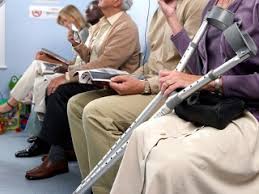July 31st, 2011 by Edwin Leap, M.D. in Health Policy, Opinion
No Comments »

Last night I was contacted by a physician in the local urgent-care. I like him, and we made polite, but brief, conversation. ‘So, are you guys busy?’
I gave him the status report. ‘Well, yeah. We have about 25 people waiting to be seen the waiting room is full and every patient room is full. Also, we just received a gun-shot wound to the head by EMS.’
‘Wow, sounds terrible! So, here’s what I need to send you…’
What he sent was, in fact, reasonable. A young woman with signs and symptoms of meningitis (who was treated earlier in the day for and upper respiratory virus…with Amoxicillin, of course.)
She needed a lumbar puncture, which I performed and which was negative.
But I had this thought. I could probably have said, Read more »
*This blog post was originally published at edwinleap.com*
February 26th, 2011 by Steven Roy Daviss, M.D. in Health Policy, Opinion
No Comments »


I read today that Eastern Ontario has started a bed registry to keep track of where open psychiatric beds are available. This is something I’ve long advocated. The United States now has less than 10 percent of the beds it used to have 50 years ago. Granted, treatment has improved and community resources are enhanced. But there are still areas that often do not have a sufficient number of hospital beds for folks needing acute inpatient psychiatric care.
 The Ontario story described in the Ottawa Citizen states that six of the area hospitals have been connected to a computerized “bed board” that provides real-time information on who has an appropriate bed available. This saves time in the ER and gets patients to needed treatment more quickly. Otherwise calls need to be made to each individual hospital, which is very time-consuming.
The Ontario story described in the Ottawa Citizen states that six of the area hospitals have been connected to a computerized “bed board” that provides real-time information on who has an appropriate bed available. This saves time in the ER and gets patients to needed treatment more quickly. Otherwise calls need to be made to each individual hospital, which is very time-consuming.
And it’s not uncommon for all the beds to be full. Last July there was an EMTALA complaint against a hospital in Maryland because a patient sat in the ER all weekend, and this hospital said they had no beds to admit the patient to. The Department of Health and Mental Hygiene (DHMH) investigated the complaint and found that indeed the hospital was full that weekend. The ER’s record indicated that all the hospitals (except the state hospitals) were called that weekend and all indicated their beds were full. So DHMH visited every hospital (about 28, I think) thinking that surely one of them had an empty bed they were hiding. What they discovered was that every single psychiatric bed in the state was full.
Unfortunately, we have no way of determining how often this happens, but we know if happens often enough. A “bed board” like this would be very helpful in quickly finding beds when needed and keeping track of the extent of this problem. Having patients wait in ER for days is unsafe and is even discriminatory. How many people with stroke or uncontrolled diabetes sit in ER for days waiting to find a bed for treatment? I’d like to hear others’ thoughts on how this problem can be addressed.
*This blog post was originally published at Shrink Rap*
February 5th, 2011 by Veronica Sikka, M.D., Ph.D. in Health Policy, Opinion
No Comments »
 In 1986, when Congress passed the Emergency Medical Treatment and Active Labor Act (EMTALA), hospitals and ambulance services were mandated by law to stabilize anyone needing emergency healthcare services regardless of citizenship, legal status, and/or insurance status.
In 1986, when Congress passed the Emergency Medical Treatment and Active Labor Act (EMTALA), hospitals and ambulance services were mandated by law to stabilize anyone needing emergency healthcare services regardless of citizenship, legal status, and/or insurance status.
This was instituted at the time to prevent the prevalent practice of “dumping” — refusing to treat patients because of insufficient insurance or transferring or discharging patients on the basis of anticipating high diagnosis and treatment costs. While the implications of this law are indeed very noble in providing undifferentiated care to all patients based solely on healthcare needs and not financial status, it has unfortunately led to many patients presenting to the emergency department (ED) for primary care issues.
The misconception is that the care in the ED is similar if not better (because of increased access to consult services and imaging) and quicker than waiting to see your primary care physician (PCP). A 2010 study published in Health Affairs found that 14 percent to 27 percent of visits to hospital EDs are nonemergent, such as minor infections, strains, fractures, and lacerations. The study found that all of these cases could have been appropriately triaged in urgent care centers or retails clinics.
England has a model that may be a potential solution. The healthcare goal of the National Health Services (NHS) is to “treat the right patients in the right place at the right time.” The NHS employs nurses and paramedics to handle 999 (their equivalent of our 911) triage calls with more appropriate triaging of patients based on acuity. Read more »
August 9th, 2010 by Edwin Leap, M.D. in Better Health Network, Health Policy, Opinion, True Stories
No Comments »

This is my column in [the August 3rd] Atlanta Journal Constitution:
Secretary of Labor Hilda Solis recently produced an interesting public service announcement. In it, she stated that every worker deserves to be paid fairly for his or her labor (whether the worker is documented or not), and offered both a website and telephone hot-line which workers could use to report unfair payment by employers. (Incidentally, here’s the link: www.dol.gov/wecanhelp.) In the video, she stated succinctly, “You work hard, and you deserve to be paid fairly.”
Those of us who practice medicine completely agree. So we might reasonably ask if this announcement also applies to physicians who are undercompensated for their work. This routinely happens when patients are covered by Medicare and Medicaid, or by large insurance companies like Blue Cross/Blue Shield, which routinely negotiate unfair physician fees using their collective weight in bargaining. (Even as their executives bring home tidy bonuses that are clearly padded by denials). Read more »
*This blog post was originally published at edwinleap.com*
January 11th, 2010 by RyanDuBosar in Better Health Network, News
No Comments »

ACP Internist’s wrap-up of current events continues with ping-pong for health care reform, how the recession curbed health care spending and how legislation preventing patient-dumping can hurt the physicians required to provide treatment.
Health care reform
 Negotiations for health care reform will avoid the formal conference procedure and instead negotiate directly. The “ping-pong” talks, which don’t have to be public, will send the bill back-and-forth between the House and Senate until both chambers agree. C-SPAN wants to televise the negotiations. The goal is to pass the legislation by a State of the Union speech scheduled for February. (Los Angeles Times, C-SPAN, Baltimore Sun)
Negotiations for health care reform will avoid the formal conference procedure and instead negotiate directly. The “ping-pong” talks, which don’t have to be public, will send the bill back-and-forth between the House and Senate until both chambers agree. C-SPAN wants to televise the negotiations. The goal is to pass the legislation by a State of the Union speech scheduled for February. (Los Angeles Times, C-SPAN, Baltimore Sun)
The recession did what Congress has struggled to do–slow spending for health care. Spending on physicians and services rose by 4.4% in 2008 over the previous year, the slowest increase in 50 years of tracking by the Centers for Medicare and Medicaid Services. Still, spending totaled $2.3 trillion, or more than 16% of the entire economy. The credit freeze in the most recent recession may have dissuaded people from paying large deductibles. (AP, USA Today) Read more »
*This blog post was originally published at ACP Internist*
















